| 
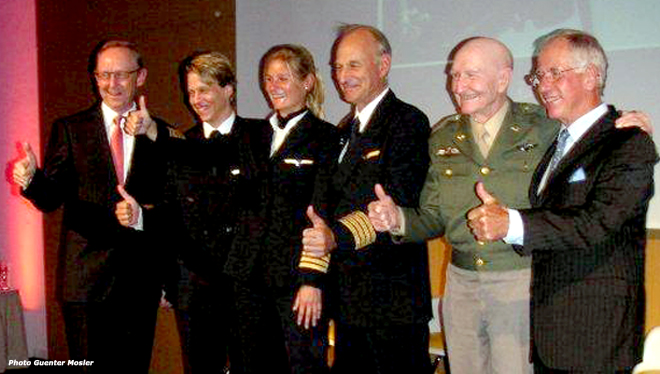
During the Second World
War, it was common for moviegoers in America to jump up and cheer every
time an action hero like John Wayne in “The Flying Tigers”
shot down the enemy.
When it was us against them, we recall
everybody was thrilled at any indication that the good guys were winning.
Fast forward to 2011, as Gail Halvorsen,
the 91-year-old U.S. Berlin Airlift pilot, is back in his pilot’s
uniform standing on a stage with a group of pilots, including the top
executives from Lufthansa Cargo.
The message was clear: although the years
have flown by and characters have changed, the good guys are winning
again.
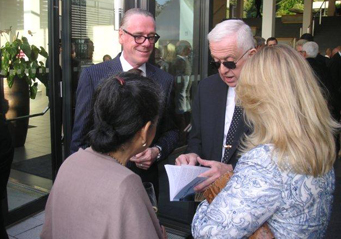 Mighty
Lufthansa Cargo is currently surging, awash in profits and opportunities,
a dynamic driver of the entire airline, with people from the top down
showing no sign of slowing down. Mighty
Lufthansa Cargo is currently surging, awash in profits and opportunities,
a dynamic driver of the entire airline, with people from the top down
showing no sign of slowing down.
The scene was the 100 Years of Air Cargo
event last week as Lufthansa pulled out all the stops with conference
sessions that looked at air cargo yesterday, today & even a bit
of tomorrow (story above).
But Friday night was special: good old
fashioned, back thumping, grand banquet time, as a clear, blue sky hour
of cocktails and conversation led to a candlelight gathering of old
and new friends. The event was punctuated with historical big band charts
and air cargo films of yesteryear, speeches and even a charity draw.
But as usual, the best and most lasting
take away were the memories of friends at a really great party.
“I am doing really well in retirement,”
said Klaus Holler, who stepped down last year as Lufthansa Cargo’s
top executive in the Americas, (pictured, left with Jean-Peter Jansen,
right)
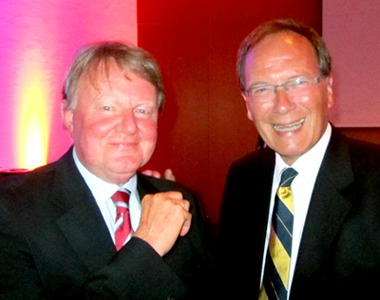 “Now it’s a question of visits
to the grand kids and for them to come and spend time with Birgitte
and me – and of course the new custom of trying to figure out
which way to turn in the morning,” he smiled.
“Now it’s a question of visits
to the grand kids and for them to come and spend time with Birgitte
and me – and of course the new custom of trying to figure out
which way to turn in the morning,” he smiled.
“But it was time to move on and
this new life gets better every day.”
Klaus’s old boss and one-time top
executive at Lufthansa Cargo, Jean-Peter Jansen, who charted the carriers
cargo fortunes during 2000-2006, a time post-9/11 when the business
evaporated and changed rapidly, recalled those challenges.
With not only security, but also fuel
and major business issues coloring almost every decision, as Mr. Jansen
recalled.
“What stands out in my mind are
the great people who worked their way through some pretty tough times.
“It’s good to see many of
those people tonight and recall how we all pulled together to build
a greater Lufthansa Cargo, and how the company has emerged today.”
Perhaps the greatest (unspoken) contribution
of Jansen, who we are pleased to report is still a delightful ebullient
personality, was his decision to fall on his sword and sacrifice his
own career by leading Lufthansa Cargo into a very early settlement in
the ongoing price-fixing scandal, which continues today.
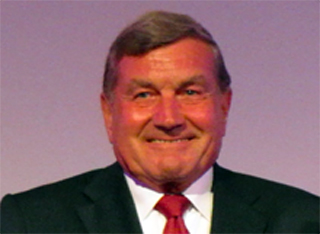 Good to see Wilhelm Althen, who also led
the fortunes of Lufthansa Cargo until 2000. He noted that during his
tenure “we were opening all kinds of new routes and destinations
across the world, and organizing German Cargo, which pioneered the perishables
business for Lufthansa because we saw the great potential of air freight.”
Good to see Wilhelm Althen, who also led
the fortunes of Lufthansa Cargo until 2000. He noted that during his
tenure “we were opening all kinds of new routes and destinations
across the world, and organizing German Cargo, which pioneered the perishables
business for Lufthansa because we saw the great potential of air freight.”
Mr. Althen, retired and living in Budingen
near Seeheim, says he still takes great interest in following air cargo
and reads “every issue of FlyingTypers.”
Looking ahead, Lufthansa Cargo Chairman
Karl Ulrich Garnadt, a dedicated leader who is concerned and proactive
with environmental issues, also noted his determination to maintaining
the growth of big numbers that his company is currently delivering to
the airline.
“We intend to leave our stamp on
the international air cargo business in the future and continue writing
our success story,” he said.
“The way ahead hinges, however,
on the economic and infrastructural environment in which the industry
operates.
“The threatened ban on night flights
at Germany’s major airport in Frankfurt is just one example of
the difficult issues facing the airlines.
“If companies are to invest heavily
in infrastructure and modern and efficient aircraft, however, they require
planning security,” Mr. Garnadt said.
Geoffrey/Flossie
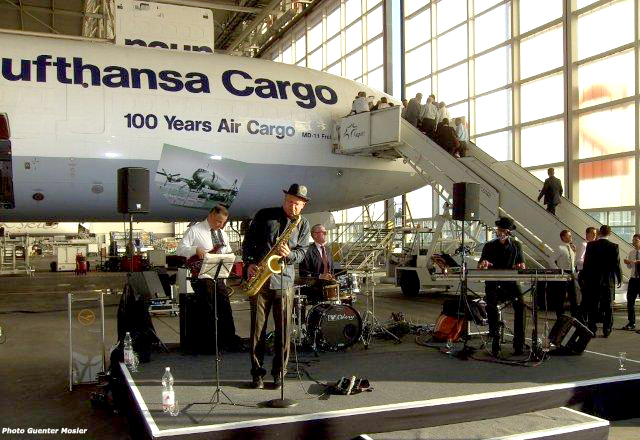
Billboarding History…
Lufthansa Cargo celebrated “100 years of Air Cargo In Germany”
revealing a special cargo graphics package on one of its MD-11
freighters at a hangar party last Thursday in Frankfurt.
The MD- 11 recalls milestones in
the history of Lufthansa Cargo.
|
|



